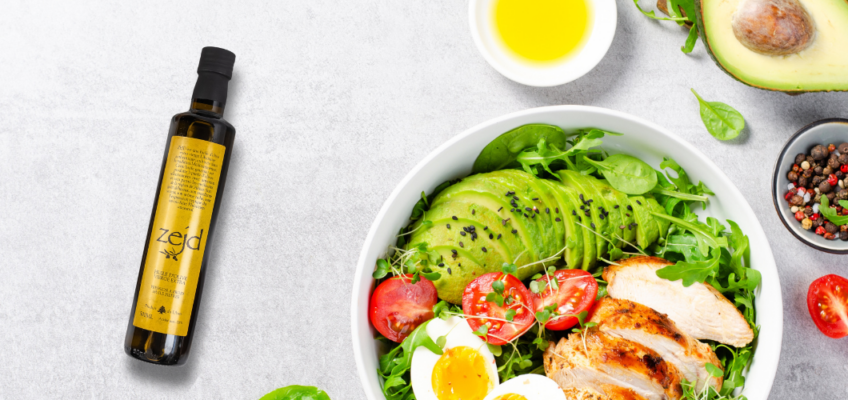Packed with flavors and nutrients, coveted for its health benefits, and versatile in its culinary applications, extra virgin olive oil (EVOO) is the shining star in every kitchen. So how to make
the best out of it in a balanced and nutritious diet?
EVOO is rightfully regarded as a superfood due to its nutrient-rich content and numerous health benefits. Rich in healthy fats, it contains a high amount monounsaturated fats known to support heart health. It also contains a favorable ratio of omega-3 to omega-6 fatty acids known to reduce inflammation. EVOO is packed with antioxidants, such as vitamin E and polyphenols, which help protect the body against oxidative stress and inflammation, and reduce the risk of chronic diseases. Besides, antioxidants and healthy fats in EVOO support brain health. Some of the nutrients in EVOO even have anti-microbial properties.
Simply put, regular consumption of EVOO promotes overall wellbeing. But that’s not all, as EVOO proved to be instrumental in nutrient uptake; whereby it enhances the absorption of fat-soluble vitamins, antioxidants, and many essential nutrients from other food, improving overall nutrient intake.
Actually, integrating EVOO into a balanced diet can be both delicious and healthful, when considering these nutritional aspects:
- Variety of Foods: Combine EVOO with a diet rich in a variety of foods to enhance overall nutrition.
- Dietary Fiber: Include plenty of fiber-rich foods like vegetables, fruits, and whole grains to aid digestion and support overall health.
- Lean Proteins: Include lean proteins like poultry, fish, eggs, legumes and beans to get necessary nutrients and essential amino acids without excess fat and calories.
- Dietary Fats: Balance overall fat intake by incorporating other healthy fats, like nuts, seeds, and avocados, alongside EVOO to maintain overall health.
- Omega-3 vs Omega-6: While Omega-6 fatty acids are essential and common in the diet, make sure to include sources of Omega-3s, like fatty fish or flaxseeds, to maintain a proper balance.
- Health Goals: Replace unhealthy fats (trans fats, saturated fats) with EVOO to support heart health and reduce the risk of chronic diseases.
- Dietary Balance: Ensure that the overall diet remains balanced in macronutrients (proteins, fats, carbohydrates) and micronutrients (vitamins, minerals).
- Caloric Intake: Adjust the rest of the diet to account for the caloric density (120 calories per tablespoon) of EVOO. Reduce the intake of other fats or calorie-dense foods if necessary.
- Weight Management: Monitor overall calorie intake and physical activity to maintain a healthy weight while incorporating EVOO.
To effectively incorporate EVOO into your diet and reap nutritional and health benefits, while maintaining a balanced and nutritious dietary intake, combine it, in moderation, with a variety vegetables, fruits, whole grains, lean proteins, and other healthy fats.







Leave a Reply